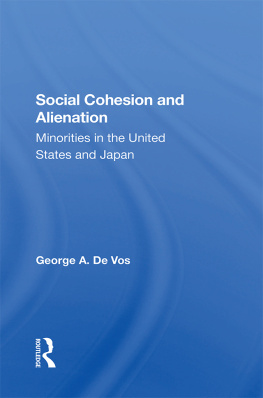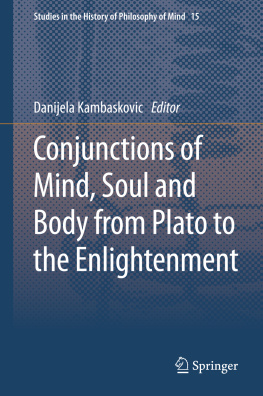Melinda Madew, Claudia Schulz, Prakash Dhakal (Hg.)
Discourses in Social Cohesion
Difference, Diversity, Body, Mind and Soul
Schriften der Evangelischen Hochschule
Ludwigsburg
im Verlag der Evangelischen Gesellschaft
Melinda Madew, Claudia Schulz, Prakash Dhakal (Hg.)
Discourses in Social Cohesion
Difference, Diversity, Body, Mind and Soul
Bibliografische Information der Deutschen Bibliothek:
Die Deutsche Bibliothek verzeichnet diese Publikation in der Deutschen Nationalbibliografie; detaillierte bibliografische Daten sind im Internet ber http://dnb.ddb.de abrufbar
2015 Verlag und Buchhandlung der Evangelischen Gesellschaft GmbH, Stuttgart. Augustenstr. 124, 70197 Stuttgart, Telefon 0711 60100 0,
Fax 60 100 76
www.verlag-eva.de
Alle Rechte vorbehalten.
ISBN 978-3-7918-8058-7
eISBN 978-3-7918-8059-4
Introduction
It was the womens movement who began identifying the body as a locus of power. It was with the awareness that the body is the location of power, more so when desired and valued characteristics are embodied. What is desired and valued are defined largely by a culture that assigns power to those who control societal resources. The womens movement articulated the manner by which the female body has been objectified and defined according to existing standards of acceptability or unacceptability. There were normative standards around which the female body has been made to conform. The womens movement drew the connection between those who attempt to control the body and those who assert autonomy over their own bodies. The movement drew attention to the many subtle and pronounced attempts by which the body is defined according exclusive categories of valuation and desirability. This is because the body carries differentiated cultural markings and physical differences. The body is not only categorized but also interpreted. The body is owned and disowned. The body is power location at one time and power dislocation at another.
This has brought us to discourses in the acceptance of differences as a form of respecting diversity. However, diversity discourse is meaningless unless set against the issue of power. Acceptance of difference in all its biological and cultural characteristics has been relegated to tolerance. But even the act of toleration is not equal to respect. It is for this reason that we refer to the womens movement which has broadened our scope of practical understanding. Through their politics of sexuality and gender, the dynamics of power relationships can be sharply drawn and understood. Women are not tolerated, they are respected. From this position, the womens movement has taught us valuable strategies in claiming equality and inclusion in significant political processes that secure sustainable gains. This contribution has sharpened our understanding that differences brought about categories of race, sexual orientation, disability and class situates all of us in positions of power or disempowerment.
For the past several years we have been joined by colleagues from at least seven universities in Europe to interact with students who bring their diverse backgrounds and personal characteristics in thematic discussions over diversity, social cohesion and inclusion. These discussions were set against their sense of identity and experiences. Many colleagues have helped us lead discussions on how embodied differences have profound impact in the manner relationships are transacted. We refer specifically to our students who will eventually assume the roles of social workers, deacons, health workers, family counselors as they attempt to measure up to policy expectations and remain aware at all times that there is a critical balance between principle and actual practice.
This is our attempt to capture some of those shared insights resulting from lecture sessions and interaction with groups of students from different universities in Europe: Newman University, Birmingham, Great Britain, Diaconia University of Applied Sciences (Diak), Finland, Diakonhjemmet University College, Norway, Jabok Institute of Theology and Social Work, Prague, Czech Republic, Jan Dlugosz University, Poland, Thomas More University, Belgium, University of Applied Sciences Nordwestschweiz, Switzerland, and the Protestant University of Applied Sciences, Ludwigsburg, Germany.
We thank the different universities who have collaborated with us for over five years in the implementation of intensive summer academies under the Erasmus Program. It was from these intensive academic exchanges that teachers and students from European universities debated differences and affirmed commonalities in an open non-judgmental atmosphere. We are grateful to our students and graduates, who to this day have built on their experiences and share these with us using virtual media. The summer academies could not have successfully taken place without the support of administrative staff in different universities. We thank most specifically the colleagues from International Offices. We appreciate the generosity of the Protestant University of Applied Sciences Ludwigsburg for supporting the printing of this book as part of its series of published academic works. The publication of this book is a bilingual experiment that tests our capacity to transcend the limitations imposed by language in the process of communicative learning. We thank the German Academic Exchange Service (DAAD) for investing in our commitment to optimize the Erasmus Intensive Program in promoting our social advocacy for inclusionary policies in Europe.
Melinda Madew, Claudia Schulz and Prakash Dhakal
Einleitung
Es war die Frauenbewegung, die damit begonnen hat, den Krper als Ort der Macht zu identifizieren. Dies geschah im Bewusstsein, dass hier Merkmale des Menschen verkrpert und zum Ausdruck gebracht sind, die erwnscht und Wert geschtzt werden. Was erwnscht und Wert geschtzt wird, ist grtenteils von einer Kultur bestimmt, die diejenigen bevollmchtigt, die die Ressourcen des sozialen Lebens kontrollieren. Die Frauenbewegung verdeutlichte, auf welche Weise der weibliche Krper entsprechend der bestehenden Standards als akzeptabel oder weniger akzeptabel bestimmt wurde. Es waren normative Standards, denen der weibliche Krper entsprechen sollte. Die Frauenbewegung machte den Zusammenhang sichtbar zwischen jenen, die eine Kontrolle ber die soziale Konstruktion des Krpers anstreben, und denen, die die Autonomie ber ihren eigenen Krper beanspruchen. Die Bewegung lenkte die Aufmerksamkeit auf viele ausgesprochene und unausgesprochene Ansprche, aufgrund derer der Krper nach exklusiven Kategorien von Wertigkeit und Mangelhaftigkeit bestimmt wird. Dies geschieht, indem der Krper auf differenzierte Weise kulturelle Merkmale und physikalische Unterschiede transportiert. Er wird auf diesem Weg nicht nur kategorisiert, sondern ebenso interpretiert, anerkannt oder verleugnet. Der Krper ist damit der Ort der Macht wie auch der Verwerfung, der Strung individueller Potenziale.
Dies hat uns zu Diskursen darber gefhrt, wie die Akzeptanz von Unterschieden gerade in Bezug auf den Krper als eine Form des Respekts gegenber der Diversitt gesehen und entwickelt werden kann. Die Akzeptanz von Unterschieden in allen ihren biologischen und kulturellen Charakteristiken muss zur Toleranz fhren. Aber Toleranz ist nicht identisch mit Respekt. Aus diesem Grund greifen wir auf die Erkenntnisse der Frauenbewegung zurck, die unsere Spielrume des praktischen Verstndnisses geweitet hat und es ermglicht hat, die Dynamik von Machtverhltnissen scharf zu zeichnen. Frauen wollen nicht toleriert, sondern respektiert werden. Aus dieser Position heraus hat die Frauenbewegung uns Strategien gelehrt, Gleichberechtigung und Inklusion in signifikanten politischen Prozessen einzufordern, die diese Ziele nachhaltig sichern sollen. Es geht um ein Verstndnis dafr, wie Kategorien von Rasse, sexueller Orientierung, Behinderung und sozialer Klasse uns alle in eine Position von Macht oder Machtlosigkeit bringen.





